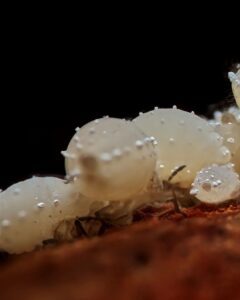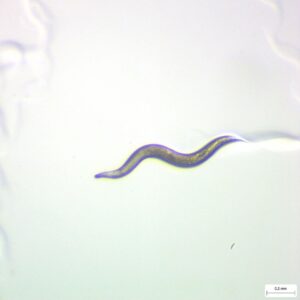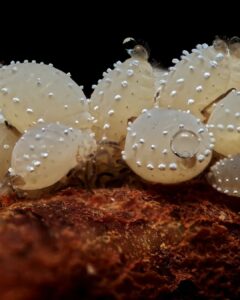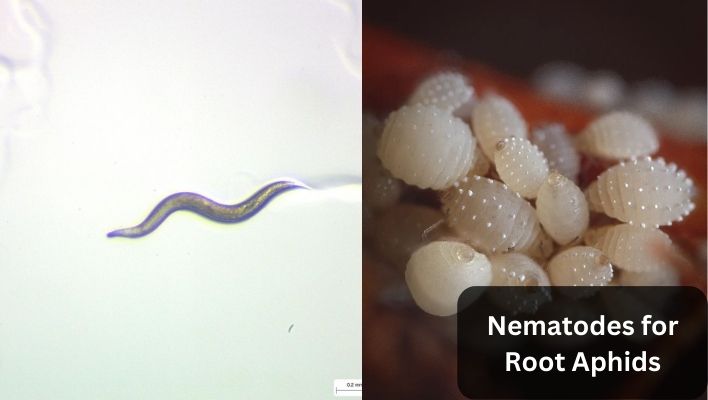Nematodes for root aphids; When it comes to dealing with pesky pests that wreak havoc on our beloved plants, finding effective and natural solutions is key. One such solution that has gained attention in recent years is the use of nematodes.
But what exactly are nematodes, and how do they contribute to pest control? In this article, we’ll dive into the world of nematodes and explore their effectiveness in combating root aphids.
Nematodes are microscopic roundworms that exist in various habitats, including soil, freshwater, and marine environments. While some nematode species are parasitic and can cause harm to plants and animals, there are beneficial nematodes that play a crucial role in controlling pests. These beneficial nematodes are commonly used in organic farming and gardening practices.
Now, let’s focus specifically on root aphids. These tiny insects may be small in size, but they can cause significant damage to the root systems of plants. Root aphids feed on plant roots, depriving them of essential nutrients and causing stunted growth, wilting, and even death.
Traditional methods of root aphid control often involve chemical pesticides, but the use of nematodes offers a natural and eco-friendly alternative.
Nematodes have shown remarkable effectiveness in targeting and eliminating root aphids. These microscopic warriors have a unique mechanism of action that makes them a formidable weapon in the fight against these pests.
Below, we’ll explore how nematodes control root aphids and delve into the benefits of using them as part of an integrated pest management strategy.
Root Aphids and Their Characteristics
Root aphids are minuscule insects that belong to the aphid family and specifically target plant roots. Unlike their above-ground counterparts, these pests dwell below the soil surface, hidden from view.
Root aphids pose a significant threat to the health and vitality of our plants, as they feed on the tender root systems, causing substantial damage.
The impact of root aphids on plants is multi-faceted. Firstly, they sap vital nutrients from the roots, leading to nutrient deficiencies and weakening the overall growth of the plant. This often results in stunted growth, wilting leaves, and a general decline in plant vigor.

Additionally, root aphids excrete a sticky substance called honeydew, which attracts mold and fungal pathogens, further compromising the plant’s health.
Identifying a root aphid infestation requires keen observation. Look out for signs such as yellowing or discolored leaves, wilting despite adequate watering, and a general lack of plant vitality.
Examine the roots carefully for the presence of small, soft-bodied insects, which may appear white, green, or black, depending on the species. Sticky honeydew secretions on leaves or nearby surfaces may also indicate the presence of aphids.
Early detection and swift action are crucial when dealing with root aphids to prevent further damage.
Understanding Nematodes
Nematodes, those microscopic superheroes of the natural world, are fascinating creatures with unique characteristics. These cylindrical, unsegmented worms belong to the phylum Nematoda and are found in diverse environments worldwide, including soil, water, and even within plants and animals.
What sets nematodes apart is their incredible diversity. There are thousands of different nematode species, each with its specific traits and behaviors. Some nematodes are free-living, feeding on organic matter in the soil, while others are parasitic, preying on insects, animals, or even plants.

It’s the parasitic nematodes that hold the key to pest control. Certain species of nematodes are highly effective in combating plant pests, including root aphids. These beneficial nematodes act as natural predators, seeking out their target pests and utilizing them as hosts for reproduction.
The benefits of nematodes for pest control are plentiful. Firstly, they provide a natural and environmentally friendly alternative to chemical pesticides, reducing the reliance on harmful substances.
Additionally, nematodes are highly specific in their prey choice, targeting only the pests while leaving beneficial organisms unharmed. They also possess the ability to persist in the soil, providing long-term pest control solutions.
By harnessing the power of these tiny warriors, we can effectively manage pest populations while maintaining the ecological balance of our gardens.
How Nematodes Control Root Aphids
When it comes to combatting root aphids, certain nematode species emerge as formidable allies in the battle. Among these, two commonly used nematode species stand out: Steinernema feltiae and Heterorhabditis bacteriophora.
The life cycle of nematodes follows a fascinating pattern. They start as infective juveniles, which are the active and mobile stages of the nematode’s life. These juveniles actively seek out their prey, including root aphids, in the soil. Upon locating a suitable host, they enter the aphid’s body through natural openings or by penetrating the cuticle.
Once inside the aphid, the nematodes release symbiotic bacteria from their gut. These bacteria multiply and release toxins, causing septicemia within the aphid’s body.
The toxins gradually kill the aphid, while the nematodes feed on the nutrient-rich contents. As the aphid decomposes, the nematodes continue to reproduce within the aphid cadaver.
With the completion of their life cycle, the nematodes emerge as infective juveniles from the aphid carcass, ready to seek out new prey and repeat the process. This cycle continues, with nematodes infecting and eliminating root aphids, effectively reducing their populations.
It’s important to note that nematodes are most effective when the environmental conditions are favorable. They thrive in moist soil with temperatures ranging between 12 to 30 degrees Celsius (54 to 86 degrees Fahrenheit). Therefore, proper timing and application under suitable conditions maximize the success of nematode treatments.

How to Use Nematodes for Root Aphids
Controlling root aphids using nematodes is a simple and effective process. Here’s a step-by-step guide to applying nematodes to the affected areas:
- Identify the affected plants: Carefully inspect your plants for signs of root aphid infestation, such as wilting leaves, stunted growth, and discolored roots. Confirm that root aphids are the cause of the problem before proceeding.
- Purchase nematodes: Obtain high-quality nematodes specifically formulated for controlling root aphids. such as Steinernema feltiae and Heterorhabditis bacteriophora. These can be found at garden centers, online suppliers, or through specialized pest control companies.
- Water the soil: Before applying the nematode solution, thoroughly water the affected soil. This helps create a moist environment, ensuring the nematodes can move easily through the soil and reach the root aphids.
- Prepare the nematode solution: Follow the instructions provided with the nematode product. Typically, you will mix the nematodes with water to create a solution. Use clean, non-chlorinated water at a temperature suitable for the nematode species being used.
- Apply the nematode solution: Use a watering can, sprayer, or any suitable application method to distribute the nematode solution evenly around the affected plants’ root zones. Ensure the solution reaches the soil where the root aphids are present.
- Maintain moisture levels: After application, it’s essential to keep the soil consistently moist for the nematodes to remain active and effective. Regularly water the treated areas, but avoid overwatering, as excessive moisture can be detrimental to the plants.
Optimal conditions and timing for nematode application:
- Soil temperature: Nematodes are most active and effective in soil temperatures between 12 to 30 degrees Celsius (54 to 86 degrees Fahrenheit). Applying nematodes when soil temperatures are outside this range may reduce their effectiveness.
- Moisture levels: Keep the soil moist, but not waterlogged, before and after applying nematodes. Adequate moisture helps nematodes move through the soil and locate the root aphids.
- Timing: Apply nematodes early in the morning, during the late afternoon, or early evening when temperatures are cooler. Avoid applying nematodes during periods of extreme heat or direct sunlight, as this can decrease their survival rate.
Precautions and considerations for a successful application:
- Follow the instructions: Read and carefully follow the instructions provided with the nematode product. Each product may have specific guidelines for application, storage, and handling.
- Storage and shelf life: Store nematodes as instructed, typically in a refrigerator, until the expiration date mentioned on the package. Using fresh nematodes ensures their viability and effectiveness.
- Compatibility with other products: Avoid using chemical pesticides or other soil treatments that may harm nematodes. Consult the nematode product instructions or contact the supplier for compatibility information.
- Monitor and repeat applications: Keep an eye on the plant’s health and monitor the population of root aphids. If necessary, repeat nematode applications as recommended on the product label or as per the severity of the infestation.
By following these instructions and considering the optimal conditions for nematode application, you can effectively combat root aphids and restore the health of your plants using this natural and eco-friendly method.
Benefits of Using Nematodes
When it comes to combating root aphids and other pests in your garden, nematodes offer a multitude of advantages. Let’s explore the benefits of using nematodes for root aphid control:
- Effectiveness: Nematodes have proven to be highly effective in controlling root aphids. They target these pests directly, infecting and eliminating them from the soil. As natural predators, nematodes actively seek out their prey, ensuring a targeted approach to pest control.
- Eco-Friendly Nature: One of the most significant advantages of nematodes is their eco-friendly nature. Unlike chemical pesticides, nematodes pose no harm to humans, pets, beneficial insects, or the environment. They provide a natural, sustainable solution to pest control, reducing the need for harmful chemicals.
- Specificity: Nematodes are highly specific in their prey choice. They target pests like root aphids while leaving beneficial insects unharmed. This specificity ensures that the balance of beneficial organisms in your garden remains intact, promoting overall ecological health.
- Long-Term Solution: Nematodes can persist in the soil, providing long-term pest control. Once applied, they continue to search for prey, keeping pest populations in check over an extended period. This reduces the likelihood of recurring infestations and the need for frequent treatments.
- Integration into Pest Management Strategy: Nematodes can be integrated into an overall pest management strategy. They complement other organic pest control methods such as companion planting, crop rotation, and good cultural practices. By incorporating nematodes, you create a holistic approach to pest management that focuses on prevention and natural solutions.
Utilizing nematodes for root aphid control aligns with sustainable gardening practices and promotes a healthier ecosystem in your garden.
These tiny warriors offer an effective, safe, and long-term solution, making them a valuable tool in your pest control arsenal.
Alternatives to Nematodes for Root Aphids
There are several alternative methods to nematodes for controlling and killing root aphids. Below are some commonly used methods:
- Insecticidal Soaps and Oils: Insecticidal soaps and oils are safe and environmentally friendly options for controlling root aphids. These products work by suffocating the insects, disrupting their cell membranes, or interfering with their feeding. Insecticidal soaps and oils should be applied directly to the foliage and soil around the affected plants according to the manufacturer’s instructions.
- Neem Oil: Neem oil is a natural insecticide derived from the neem tree. It contains compounds that disrupt the life cycle of pests, including aphids. As a soil drench, neem oil can be mixed with water and sprayed onto the leaves and soil to control root aphids. It is important to follow the instructions on the product label for proper dilution and application.
- Horticultural Vinegar: Horticultural vinegar, also known as horticultural acetic acid, is a stronger form of vinegar used as a non-selective herbicide. It can also be used to control root aphids by applying it to the soil. However, caution should be exercised when using horticultural vinegar, as it can damage desirable plants and should be used with care.
- Botanical Insecticides: Several botanical insecticides, derived from plants, can effectively control root aphids. Examples include pyrethrin, derived from chrysanthemum flowers, and rotenone, derived from the roots of tropical plants. These insecticides are generally considered safer options but should still be used according to the product instructions.
- Biological Fungicides: Some biological fungicides contain beneficial microorganisms that can also help control root aphids. These microorganisms, such as Bacillus subtilis and Trichoderma species, produce compounds that inhibit the growth of aphids and other pests. Applying these fungicides to the soil can provide long-term protection against root aphids.
- Crop Rotation: Crop rotation is a preventive measure that can help disrupt the life cycle of root aphids. By rotating the types of plants grown in a specific area, the aphids’ preferred host plants are not consistently available, making it more difficult for them to establish and reproduce. However, it is important to note that some root aphid species can infest a wide range of plants, so crop rotation may not always be effective.
It’s worth mentioning that the effectiveness of these alternative methods may vary depending on the severity of the infestation and the specific circumstances.
Integrated Pest Management (IPM) approaches that combine multiple control methods are often the most effective in managing root aphids while minimizing the use of chemical pesticides.
How to Use Nematodes for Root Aphids FAQs
What are the different types of nematodes that target root aphids?
The two primary nematode species used for targeting root aphids are Steinernema feltiae and Heterorhabditis bacteriophora.
Steinernema feltiae, also known as the “fungal gnat nematode,” is effective against a wide range of soil-dwelling pests, including root aphids.
Heterorhabditis bacteriophora, on the other hand, is known for its effectiveness against a variety of insect pests, including root aphids.
Are nematodes harmful to plants or other beneficial insects?
No, nematodes are not harmful to plants or beneficial insects when used as directed. Beneficial nematodes, such as the ones used for root aphid control, are specific in their prey choice and primarily target harmful pests.
They do not harm plants, humans, pets, or beneficial insects like bees and ladybugs. Nematodes contribute to the overall ecological balance of the garden by targeting pest populations without causing harm to non-target organisms.
How long does it take for nematodes to control root aphids?
The time it takes for nematodes to control root aphids can vary depending on several factors, including the severity of the infestation, environmental conditions, and the nematode species used.
In general, it may take a few weeks for nematodes to significantly reduce root aphid populations. However, it’s important to note that nematode treatments are most effective when applied early during the infestation when root aphid populations are still relatively low.
Regular monitoring and follow-up applications may be necessary for complete control, especially in severe infestations.
Can nematodes be used in organic gardening?
Nematodes are widely used in organic gardening as a natural and environmentally friendly pest control method.
They are considered a key component of integrated pest management (IPM) strategies in organic farming and gardening practices.
Nematodes target specific pests like root aphids while posing no harm to humans, animals, or beneficial insects.
Their use aligns with the principles of organic gardening, promoting sustainable and chemical-free pest control.
Where can I purchase nematodes for root aphid control?
Nematodes for root aphid control can be purchased from various sources. Here are a few options to consider:
- Local garden centers or nurseries: Visit your local garden center or nursery and inquire about nematode products. They may carry nematode solutions specifically formulated for root aphid control.
- Online retailers: Many online retailers specialize in providing organic gardening products, including nematodes. Search for reputable online stores that offer nematodes for root aphid control. Read customer reviews and check for product certifications to ensure quality.
- Biological control suppliers: Some suppliers specifically focus on providing beneficial insects and organisms for pest control. These suppliers often offer nematode products for various pests, including root aphids.
Conclusion
In the battle against root aphids, nematodes emerge as the tiny heroes of natural pest control. These microscopic worms offer a powerful and eco-friendly solution to combat these troublesome pests, making them an invaluable asset in the world of organic gardening.
Through their unique life cycle and symbiotic relationship with bacteria, nematodes actively seek out and infect root aphids, ultimately leading to their demise.
This natural predation process provides an effective and targeted approach to pest control without posing any harm to humans, pets, or beneficial insects.
The benefits of using nematodes for root aphid control are abundant. They are highly effective, eco-friendly, and can be seamlessly integrated into an overall pest management strategy.
By incorporating nematodes into your gardening practices, you contribute to a healthier ecosystem and reduce reliance on chemical pesticides.
When it comes to purchasing nematodes for root aphid control, explore options such as local garden centers, online retailers, or specialized biological control suppliers.
Choose reputable sources that provide high-quality nematode products and follow the instructions for proper application and storage.
So, unleash the power of nematodes in your garden and bid farewell to root aphids. Embrace the natural approach and let these tiny warriors protect your plants while preserving the harmony of your garden ecosystem. With nematodes on your side, you can nurture thriving plants and enjoy the beauty of a pest-free garden.
